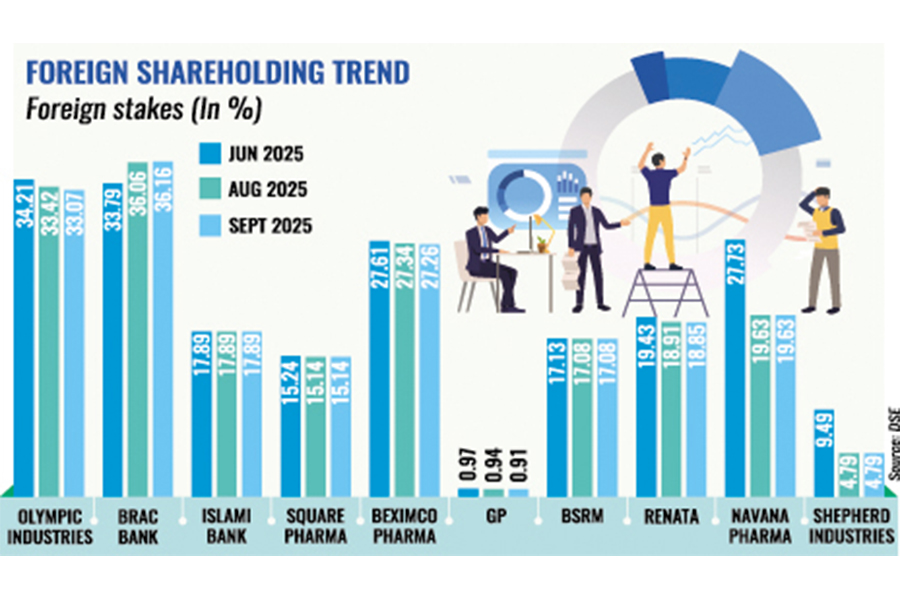
Published :
Updated :

Foreign investors have retreated from Bangladesh's equity market once again amid persistent economic challenges and fears of political friction during the electoral transition.
Economic reform measures taken by the interim government after the political changeover had given rise to optimism about a market turnaround, which is why foreign stakes in well-performing companies jumped until June this year compared to October last year.
But the hope has gradually petered out as macroeconomic challenges deepened alongside intensifying political tension in the country centering on the upcoming national election.
"Persistent political and macroeconomic challenges discouraged overseas investors from making fresh investments in stocks," said Mir Ariful Islam, managing director and CEO of Sandhani Asset Management.
Other factors, Mr Islam said, include the confidence crisis, elevated banking sector vulnerabilities, and record non-performing loans exposed in the banking sector after the political changeover.
Subsequently, the erosion of foreign stakes continued in September this year, with share purchases worth Tk 1.84 billion against selloffs of Tk 2.55 billion. Foreign investors also withdrew their funds in July and August this year.
Owing to lower participation by foreign investors, overall foreign transactions plunged 20 per cent year-on-year to Tk 12 billion in the July-September quarter this year.
That happened as the Bangladesh equity market emerged as one of the worst performers globally in September this year. The prime index plunged 3.2 per cent during the month amid broad-based profit-booking pressure.
"Foreign investors want a stable, predictable, and long-term policy environment, with particular emphasis on continuity from an elected government, so they know their capital is safe for the long term and will yield returns," said a leading broker who deals with foreign portfolios, requesting anonymity.
A low number of investable securities and frequent policy changes discourage foreigners from keeping funds in the Bangladesh equity market, said the stockbroker.
Moreover, there have been no new listings for more than 18 months in the country's stock market.
When it comes to investing in stocks in Bangladesh, foreigners are mostly interested in multinational companies. But they are now distancing themselves owing to lower-than-expected earnings in the first half of this year.
Most multinational companies saw their profits erode in the first half of 2025 compared to the same period last year, largely due to high finance costs amid political uncertainty.
Economic activities have slowed down after the political changeover, squeezing companies' profitability, according to market analysts.
Combined profits of multinational companies plummeted 29 per cent year-on-year to Tk 27.8 billion, while revenue dropped 6 per cent year-on-year to Tk 227 billion in the first half of the year.
Due to the massive sell-off, shares of blue-chip and well-performing companies dropped significantly. Overseas investors mostly prefer such stocks.
Foreign shareholding in Olympic Industries fell from 34.21 per cent to 33.07 per cent between June and September this year.
Grameenphone, the largest stock in terms of market capitalisation, experienced a similar trend. Its foreign stake declined to 0.91 per cent in September from 0.97 per cent in June this year.
Foreign stakes in Navana Pharma also fell sharply from 27.73 per cent to 19.63 per cent between June and September this year.
Only BRAC Bank saw foreign stakes rise from 33.79 per cent in June to 36.16 per cent in September this year, driven by record profit in 2024.
The leading bank achieved remarkable earnings growth to Tk 12.3 billion in 2024, marking the highest-ever net profit in its history, driven by substantial income from investments in government securities.
Akramul Alam, head of research at Royal Capital, said the high value of the dollar against the local currency remains another major concern.
Although the foreign exchange market has stabilised in recent months due to higher dollar inflows, supported by strong remittance and export earnings, the taka-dollar exchange rate remains as high as before.
"When the local currency gets cheaper, foreign investors incur losses as the value of their assets falls even when share prices remain unchanged," Mr Alam said.
He also noted that many global fund managers have rebalanced their portfolios, while some have shifted to gold to secure their investments instead of investing in equities.
However, foreign investment is expected to pick up again if the political environment remains calm after the national election, he added.
Meanwhile, the country's economy is showing signs of gradual recovery following a period of turbulence driven by the pandemic, the Russia-Ukraine war, and domestic political upheaval culminating in a regime transition.
This rebound is largely supported by rising exports, strong remittance inflows, and stable foreign exchange reserves, which have eased pressures on the country's macroeconomic front.
"Political stability, macroeconomic improvement, and consumer confidence are crucial for business in the coming months," said Mr Mir Ariful of Sandhani Asset Management.
babulfexpress@gmail.com


 For all latest news, follow The Financial Express Google News channel.
For all latest news, follow The Financial Express Google News channel.